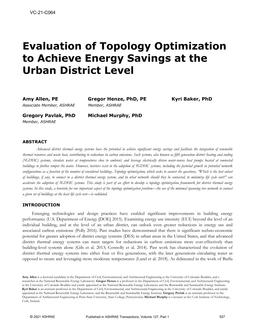
VC-21-C064 — Evaluation of Topology Optimization to Achieve Energy Savings at the Urban District Level
- Comments Off on VC-21-C064 — Evaluation of Topology Optimization to Achieve Energy Savings at the Urban District Level
- ASHRAE
Click here to purchase
Advanced district thermal energy systems have the potential to achieve significant energy savings and facilitate the integration of renewable thermal resources and waste heat, contributing to reductions in carbon emissions. Such systems, also known as fifth generation district heating and cooling (5GDHC) systems, circulate water at temperatures close to ambient, and leverage electrically driven water-source heat pumps located at connected buildings to further temper the water. However, barriers exist to the adoption of 5GDHC systems, including the factorial growth in potential network configurations as a function of the number of considered buildings. Topology optimization, which seeks to answer the questions, “Which is the best subset of buildings, if any, to connect to a district thermal energy system, and by what network should they be connected, to minimize life cycle cost?” can accelerate the adoption of 5GDHC systems. This study is part of an effort to develop a topology optimization framework for district thermal energy systems. In this study, a heuristic for one important aspect of the topology optimization problem—the use of the minimal spanning tree network to connect a given set of buildings at the least life cycle cost—is validated.
Citation: 2021 Virtual Conference Papers
Product Details
- Published:
- 2021
- Number of Pages:
- 10
- Units of Measure:
- Dual
- File Size:
- 1 file , 1.3 MB
- Product Code(s):
- D-VC-21-C064

